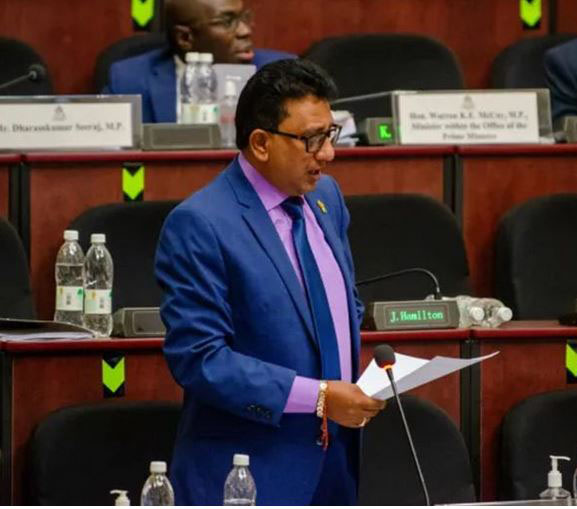A bill which will facilitate domestic and international arbitration as a method of resolving disputes was tabled on Monday during the 69th Sitting of the National Assembly at the Arthur Chung Conference Centre.
According to Legal Affairs Minister Anil Nandlall who tabled the Arbitration Bill, it is geared to place Guyana at the forefront for commercial mediation.
Arbitration is a form of alternative dispute resolution that sees the parties involved in a dispute agreeing to have the case heard by one or more arbitrators, entrusted with making a legally binding decision on the matter. Earlier this year, an arbitration unit was established to facilitate the drafting of the bill as well as capacity building for its implementation.
The Attorney General told the National Assembly that the bill has undergone extensive consultation with international law firms and includes key provisions of the United Nations Commission on International Trade Law Model Law on Arbitration. Additionally, the Improved Access to Justice in the Caribbean Project (IMPACT Justice), a regional justice sector reform project, has conducted a series of training workshops on arbitration in Guyana, to ensure its proper implementation.
According to the Arbitration Bill, where a respondent or claimant has his or her place of business or habitual residence in Guyana and the place of arbitration has not yet been determined, the court shall be the competent authority to perform the functions specified in the sections dealing with:
(a) The constitution of the arbitral tribunal
(b) The appointment of arbitrators
(c) The challenge procedure; and
(d) Failure to act or where it is impossible to do so.
Notably an arbitration agreement may be in the form of an arbitration clause in a contract or a separate agreement in writing.
The parties to an arbitration agreement are free to determine the number of arbiters but where there is no such determination, the number of mediators shall be three.
According to the bill, a person shall not be precluded because of nationality from acting as an arbitrator, unless otherwise agreed by the parties.
If a party fails to appoint the arbitrator within 30 days based on a request to do so from the other party, or if two arbitrators fail to agree on a third arbitrator within 30 days of the appointment, this shall be made based upon a request by the appointing authority (which is the court or any international organisation and arbitration centre).
According to Article 17 paragraph 1, an arbitral tribunal may rule on its jurisdiction, including any objections concerning the existence or validity of the arbitration agreement.
An arbitration clause that forms part of a contract shall be treated as an agreement independent of the other terms of the contract. A decision by an arbitral tribunal that the contract is null and void shall not be necessitated as a matter of law due to the invalidity of the clause.
A plea that the arbitral tribunal does not have jurisdiction shall not be raised later unless a statement of defence is submitted.
According to Article 20 paragraph 1, unless otherwise agreed by parties, an arbitral tribunal may at the request of a party, grant interim measures.
Moreover, the tribunal may order a party to maintain or restore the status quo pending the determination of the dispute; take action that would prevent or refrain from taking action that is likely to cause, current or imminent harm or prejudice to the arbitral process itself; provide a means of preserving assets out of which a subsequent award may be satisfied; preserve evidence that may be relevant and material to the resolution of the dispute and provide security for costs.
The Criminal Procedure Bill, which will allow for plea agreements to be made between defendants and state prosecutors before a guilty verdict, was also tabled.






